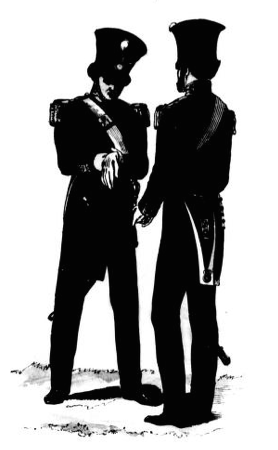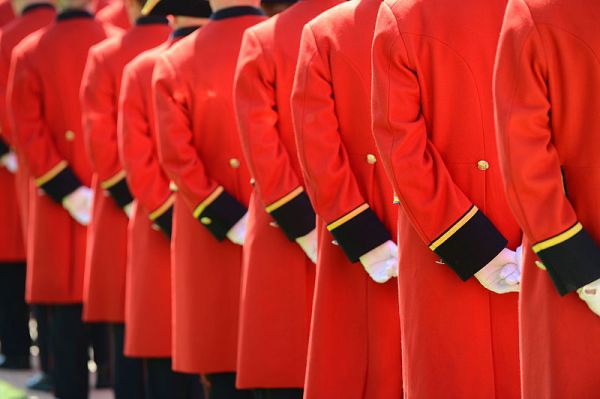There has been somewhat of a lull in posting on the site, but it is the intention to rectify that in 2015. In a recent post on another heritage blog we run, the Midleton Archaeology & Heritage Project, we looked at the records of some of the men from that parish who served in the Napoleonic Wars. Information on them had been recorded at the soldier’s homes of the Royal Hospitals in Chelsea and Kilmainham, through which they had passed. These have been digitized by Find My Past. We decided to take a look to see what records there may be relating to 19th century Bere Islanders. Historically Bere Island has been closely tied to maritime affairs, but many Islanders also served in the army. The Royal Hospital Chelsea records give us an insight into some of them, including the three islanders below, who saw varied service around the globe, from North America to Burma to the Australian Colonies.
Sergeant Denis McCarthy, Chelsea Pensioner
Denis was born around 1805 on Bere Island and was a mason by trade. He enlisted in the 2nd Battalion of the 60th Rifles at Cork on 18th January 1826 when he was 21-years-old. Denis was described as 5 feet 7 1/2 inches in height, with brown hair, grey eyes and a fresh complexion. For most of Denis’s service the regiment was known as the King’s Royal Rifle Corps, the ancestors of the Royal Greenjackets. He was promoted to Corporal on 10th November 1830 and to Sergeant on 11th April 1832. Denis, whose character was described as ‘very good’, served for a total of eight years 265 days, being discharged on 6th October 1834 as a result of ‘disability arising from constitutional causes.’ By that time he had been in the General Hospital in Dublin for a month. He spent all of his military service period in Great Britain and Ireland.
Private John O’Brien, Chelsea Pensioner
John was born on Bere Island around 1810. He was a labourer by trade, and enlisted in the 12th (Suffolk) Regiment in Londonderry on 12th November 1829 when he was 19-years-old. John was described as 5 feet 7 1/4 inches tall, with brown hair, hazel eyes and a fresh complexion. He was transferred to the 84th (York and Lancaster) Regiment on 22nd July 1834 in order that he could serve with his older brother, who was also presumably from Bere Island. He was stationed in Jamaica in the West Indies for 2 years 119 days between the 24th January 1836 and 22nd May 1838, and although he was promoted to Corporal while away he afterwards resigned that position. He later spent 6 years and 144 days in the East Indies, stationed in Burma and India. John was described as a ‘good soldier, trustworthy and sober’ and he had been awarded a good conduct badge. Despite this, his record shows that he had been court-martialled on 10th February 1845 for being absent without leave, making use of abusive language and being drunk. For this he was sentenced to two months imprisonment with the first and last 14 days in solitary confinement. He steered clear of trouble following this; after a total of 18 years, 323 days in the service, he was discharged on 17th November 1848 while serving in Secunderabad, India. John had been hospitalized on a number of occasions during his service; for ‘Cattarh’ or inflammation of the mucus membranes in 1844, with ulcers in 1846, and then with ‘cephalagia’ or severe headaches twice in 1848. The cephalagia had apparently been brought on by the foreign climate while on foreign service and it was felt a return to Europe would improve his condition. Having being discharged he headed for home, landing in Gravesend on 5th June 1849.
Private William Thomas, Chelsea Pensioner
William was born on Bere Island around the year 1812. When he was 17-years-old the labourer enlisted in the 94th Regiment in Belfast on 13th April 1829. He transferred to the 11th (Devonshire) Regiment on 8th April 1832. He would serve in the army for the next 20 years 266 days, during which time he saw the world. His career included over 15 years on foreign service, during which time he was in Gibraltar (2 1/2 years), Malta (2 months), Corfu (5 years, 4 months), Canada (2 1/2 years) and the Australian Colonies (5 years, 1 month). He received three good conduct badges during his service. William was eventually discharged as a result of chronic rheumatism in 1850, having struggled with it for three years.

The 11th Regiment in the mid-19th Century (Historical Record of the Eleventh, or the North Devon Regiment of Foot)
References
Royal Hospital Chelsea records (original document scans viewed on FindMyPast).


